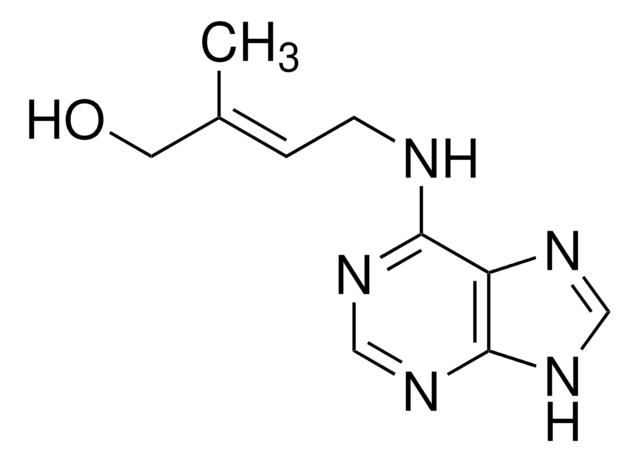B3408
6-Benzylaminopurine
suitable for plant cell culture
Synonym(s):
6-BAP, BA, N6-Benzyladenine
About This Item
Recommended Products
form
powder
Quality Level
technique(s)
cell culture | plant: suitable
application(s)
agriculture
SMILES string
C(Nc1ncnc2nc[nH]c12)c3ccccc3
InChI
1S/C12H11N5/c1-2-4-9(5-3-1)6-13-11-10-12(15-7-14-10)17-8-16-11/h1-5,7-8H,6H2,(H2,13,14,15,16,17)
InChI key
NWBJYWHLCVSVIJ-UHFFFAOYSA-N
Looking for similar products? Visit Product Comparison Guide
General description
Application
- to induce sprouting in plant materials[2]
- in seed germination medium for culturing of seeds[3]
- to modify Murashige and Skoog (MS) media for shoot initiation[4]
Biochem/physiol Actions
Signal Word
Warning
Hazard Statements
Precautionary Statements
Hazard Classifications
Acute Tox. 4 Oral - Aquatic Acute 1 - Aquatic Chronic 2 - Repr. 2
Storage Class Code
11 - Combustible Solids
WGK
WGK 3
Flash Point(F)
Not applicable
Flash Point(C)
Not applicable
Personal Protective Equipment
Certificates of Analysis (COA)
Search for Certificates of Analysis (COA) by entering the products Lot/Batch Number. Lot and Batch Numbers can be found on a product’s label following the words ‘Lot’ or ‘Batch’.
Need A Sample COA?
This is a sample Certificate of Analysis (COA) and may not represent a recently manufactured lot of this specific product.
Already Own This Product?
Find documentation for the products that you have recently purchased in the Document Library.
Customers Also Viewed
Our team of scientists has experience in all areas of research including Life Science, Material Science, Chemical Synthesis, Chromatography, Analytical and many others.
Contact Technical Service



